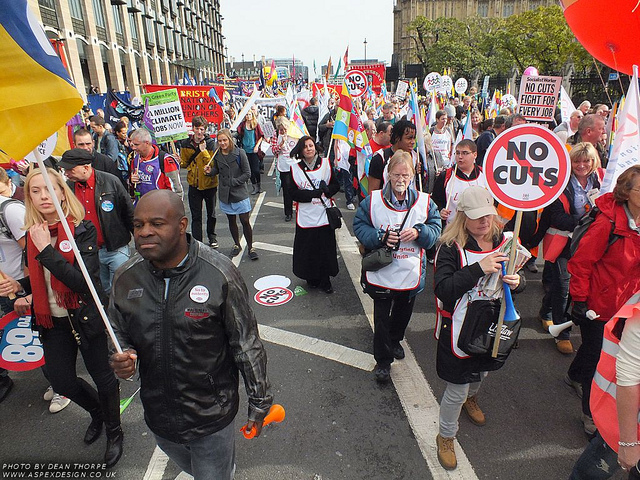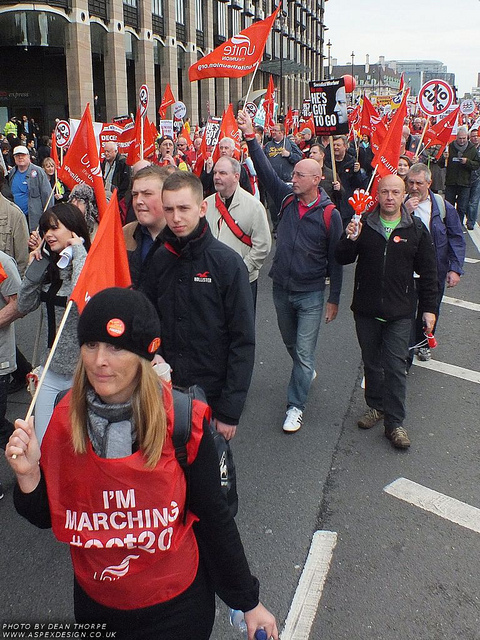The future of trade unions
Interview with Baroness Brenda Dean, Honorary Graduate
Published in September 2010
 Many of us may not be fully aware of the work that trade unions do to protect employees' livelihoods. This is in part due to the fact that currently under 10% of the population are members and also reflective of the often unfavourable representation in the national press.
Many of us may not be fully aware of the work that trade unions do to protect employees' livelihoods. This is in part due to the fact that currently under 10% of the population are members and also reflective of the often unfavourable representation in the national press.
Perhaps the public have become resigned to a future of insecure employment, no pension and no rights where trade unions are fighting a losing battle. The problem is that if you combine this with the reductions in welfare provision for the worst off in society [a recent report by the Institute of Fiscal Studies (IFS) concludes that Britain’s poorest families will be worst affected by the forthcoming budget cuts], those who have few options in the job market might be left in a desperate situation. Baroness Brenda Dean, the first woman to lead a major industrial trade union, says: “I worry that in the future this will lead to social strife. Reducing the cap on housing benefit just means that all those claiming will have to live in a low rent area; it could end in ghettos. People may be reduced to challenging law and order, taking things into their own hands.”
Union membership has reduced dramatically over the last twenty years. This is due to a combination of legislative and economic changes: “There are far more small businesses than before when big organisations dominated the steel, coal and shipping industries. Margaret Thatcher brought in laws that require a majority of workers to be part of a union before it is lawfully recognised which, together, makes it much harder for unions to organise themselves.” An increase in part-time, temporary and freelance working adds to this problem and not all managements look favourably on union membership.
Baroness Dean has been a life long trade unionist. Her talent was spotted when she was just a young receptionist - “Women did not get the top positions, my biggest aspiration was being the boss’s secretary ” - but she found that she thrived in her role as the members’ representative: “Listening to people and working with them to achieve something - I enjoyed that.” She rose through the ranks and was voted in as the General Secretary of the print union SOGAT in 1985, managing the negotiations with Rupert Murdoch as he battled to move the printing of his News International titles away from Fleet Street, at a revolutionary time in the history of the British press.

One wonders how trade unions manage to recruit members at all in these circumstances, but Baroness Dean is clear: “Trade unions keep hold of their members by offering a good service - advice and support.” In some areas union membership is increasing, where employees are in a position to collaborate: “There is an increase in public sector unions. With austerity measures threatening a 25% redundancy rate, people are looking for protection.”
For Baroness Dean it was the personal contact with employees that meant she loved her work: “When I worked in Manchester any member could pick up the phone and speak to me directly. That is no longer the case.” Face to face meetings were fundamental to the strong bonds that held her union together. Again modernity, and the proliferation of web communications, challenge the foundations of traditional trade union action: “Nowadays the union representatives are under enormous pressure and while you can contact them by email, it is not the same.”
Despite all the challenges facing union organisation Baroness Dean stands behind the principle that profit making organisations have a responsibility to shield their employees from at least some of the financial risks. It is easy to argue that workers’ rights are too expensive, but in the past such arguments have proven fallacious: “They said that securing equal pay for women would mean men would get the jobs instead which wasn’t true. They said the introduction of the minimum wage would result in vast unemployment, again not true.”
Nowadays Baroness Dean is a member of the House of Lords, still working to protect workers’ rights. She chairs the defence group looking at the rights of employees of the Armed Services as well as taking an interest in housing, pensions and the rights of women. “I think there is a contribution to be made to the legislature but there is no substitute for trade union officials.”
Brenda Dean, Baroness Dean of Thornton-le-Fylde, began her career as a trade unionist as a teenager and was elected as General President of the print union SOGAT in 1983 and General Secretary in 1985. She was the first British woman to lead a major craft or industrial trade union. She became a life peer in October 1993 as Baroness Dean of Thornton-le-Fylde, of Eccles in the County of Greater Manchester, and a Privy Councillor in 1998. She has been a member of numerous public bodies and committees, and served as Vice-Chair of the University College London Hospitals NHS Trust from 1994 until 1998, when she was appointed to Chair the Housing Corporation. She is currently serving her second three year term as Chairman of Covent Garden Market Authority, a post she has held since 1 April 2005. She is the author of Hot Mettle, an autobiography dealing largely with her time as General Secretary of SOGAT at the time of Rupert Murdoch's battles with that and other trades unions. She became an Honorary Doctor of Laws at the University of Warwick in July 2010.
Images: London Anti-austerity march 2012 by Dean Thorpe (via Flickr).
London Anti-austerity march 2012 by Dean Thorpe (via Flickr).
